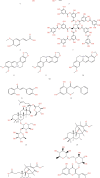Therapeutic Potential of Phytoconstituents in Management of Alzheimer's Disease
- PMID: 34211570
- PMCID: PMC8208882
- DOI: 10.1155/2021/5578574
Therapeutic Potential of Phytoconstituents in Management of Alzheimer's Disease
Abstract
Since primitive times, herbs have been extensively used in conventional remedies for boosting cognitive impairment and age-associated memory loss. It is mentioned that medicinal plants have a variety of dynamic components, and they have become a prominent choice for synthetic medications for the care of cognitive and associated disorders. Herbal remedies have played a major role in the progression of medicine, and many advanced drugs have already been developed. Many studies have endorsed practicing herbal remedies with phytoconstituents, for healing Alzheimer's disease (AD). All the information in this article was collated from selected research papers from online scientific databases, such as PubMed, Web of Science, and Scopus. The aim of this article is to convey the potential of herbal remedies for the prospect management of Alzheimer's and related diseases. Herbal remedies may be useful in the discovery and advancement of drugs, thus extending new leads for neurodegenerative diseases such as AD. Nanocarriers play a significant role in delivering herbal medicaments to a specific target. Therefore, many drugs have been described for the management of age-linked complaints such as dementia, AD, and the like. Several phytochemicals are capable of managing AD, but their therapeutic claims are restricted due to their lower solubility and metabolism. These limitations of natural therapeutics can be overcome by using a targeted nanocarrier system. This article will provide the primitive remedies as well as the development of herbal remedies for AD management.
Copyright © 2021 Anurag Kumar Singh et al.
Conflict of interest statement
The authors declare that they have no conflicts of interest.
Figures
References
Publication types
LinkOut - more resources
Full Text Sources




